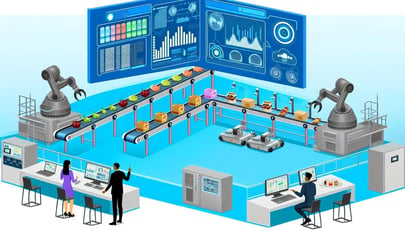Machine Learning for Global Supply Chain Visibility
In the dynamic business landscape, supply chain managers in the food and beverage industry face multifaceted challenges. From fluctuating consumer demands to volatile market conditions, the need for efficient supply chain management has never been greater. Moreover, with global supply chains becoming increasingly intricate, the demand for enhanced visibility and agility is essential.
Enter machine learning (ML), a transformative technology that promises to revolutionize supply chain management by offering unprecedented insights and foresight.
In this blog, we look into the realm of machine learning for global supply chain visibility, exploring its potential applications, benefits, and the integration with leading ERP, SCM, and MES systems like PlanetTogether and SAP, Oracle, Microsoft, Kinaxis, and Aveva.

Machine Learning in Supply Chain Management
Machine learning, a subset of artificial intelligence (AI), empowers systems to learn from data, identify patterns, and make predictions or decisions with minimal human intervention. In the context of supply chain management, ML algorithms can analyze vast amounts of data from disparate sources, including historical sales data, market trends, weather forecasts, and transportation information, to derive actionable insights.
One of the key advantages of ML in supply chain management is its ability to adapt and improve over time. As it processes more data and encounters new scenarios, ML models refine their predictions, leading to more accurate forecasts and better decision-making.
Applications of Machine Learning in Food and Beverage Supply Chains
- Demand Forecasting: ML algorithms can analyze historical sales data, promotional activities, seasonality, and external factors such as economic indicators and consumer behavior to predict future demand more accurately. This enables supply chain managers to optimize inventory levels, minimize stockouts, and reduce excess inventory.
- Inventory Optimization: By leveraging ML, supply chain managers can optimize inventory levels based on demand forecasts, lead times, supplier performance, and production capacity. This ensures that the right amount of inventory is available at the right time and location, reducing carrying costs and improving overall efficiency.
- Supply Chain Risk Management: Machine learning algorithms can assess various risk factors, such as supplier reliability, geopolitical instability, natural disasters, and market volatility, to identify potential disruptions in the supply chain proactively. This allows organizations to implement contingency plans and mitigate risks effectively.
- Transportation and Logistics Optimization: ML can optimize transportation routes, modes of transportation, and delivery schedules by considering factors such as fuel costs, vehicle capacity, traffic conditions, and customer preferences. This results in lower transportation costs, improved delivery performance, and enhanced customer satisfaction.

Integration with ERP, SCM, and MES Systems
To fully harness the power of machine learning for global supply chain visibility, integration with leading ERP, SCM, and MES systems is essential. Platforms like PlanetTogether, SAP, Oracle, Microsoft Dynamics 365 Supply Chain Management, Kinaxis RapidResponse, and Aveva Manufacturing Execution Systems (MES) provide the foundation for data collection, storage, and analysis, making them ideal partners for ML integration.
Integration between machine learning and these systems enables seamless data exchange, allowing ML algorithms to access real-time information from various sources within the supply chain ecosystem. This holistic approach enhances visibility, agility, and decision-making capabilities across the entire supply chain network.
Benefits of Integration
- Real-time Insights: By integrating machine learning with ERP, SCM, and MES systems, supply chain managers gain access to real-time insights into inventory levels, demand patterns, production schedules, and transportation logistics. This enables proactive decision-making and rapid response to changing market conditions.
- Predictive Analytics: ML integration enables predictive analytics capabilities within existing supply chain management systems. By analyzing historical data and identifying patterns, ML algorithms can forecast demand, anticipate risks, and optimize resource allocation, enabling organizations to stay ahead of the curve.
- Enhanced Collaboration: Integration fosters collaboration and communication between different departments within an organization and across its supply chain partners. By sharing actionable insights and forecasts generated by ML algorithms, stakeholders can align their strategies and work towards common goals more effectively.
- Continuous Improvement: ML integration facilitates continuous improvement by enabling feedback loops between predictive models and operational processes. As ML algorithms learn from new data and feedback, they can refine their predictions and recommendations, driving ongoing optimization and efficiency gains.
Machine learning holds immense potential for enhancing global supply chain visibility in the food and beverage manufacturing industry. By leveraging ML algorithms for demand forecasting, inventory optimization, risk management, and logistics optimization, organizations can achieve greater efficiency, resilience, and competitiveness in today's dynamic market landscape.
Moreover, integration between machine learning and leading ERP, SCM, and MES systems like PlanetTogether, SAP, Oracle, Microsoft Dynamics 365 Supply Chain Management, Kinaxis RapidResponse, and Aveva MES is key to unlocking the full benefits of ML-powered supply chain management.
By combining the power of ML with robust data management and analysis platforms, organizations can navigate complexity with confidence and drive sustainable growth in the years to come. Are you ready to take your manufacturing operations to the next level? Contact us today to learn more about how PlanetTogether can help you achieve your goals and drive success in your industry.






















LEAVE A COMMENT